外研英语八年级上册Module 5 Lao She's Teahouse. Unit 3 Language in use .课件(共30张PPT)
文档属性
| 名称 | 外研英语八年级上册Module 5 Lao She's Teahouse. Unit 3 Language in use .课件(共30张PPT) | 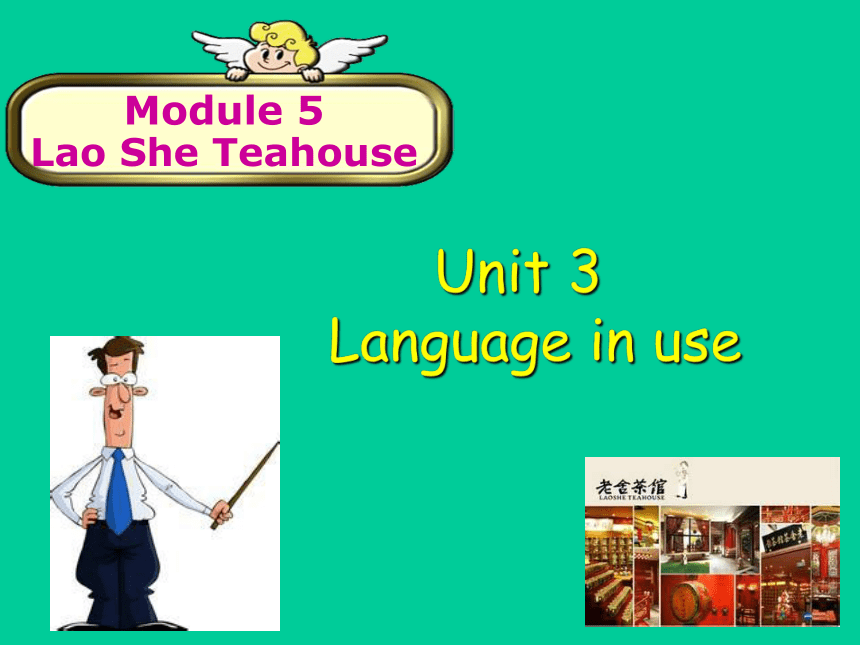 | |
| 格式 | zip | ||
| 文件大小 | 1.9MB | ||
| 资源类型 | 教案 | ||
| 版本资源 | 外研版 | ||
| 科目 | 英语 | ||
| 更新时间 | 2020-09-05 11:56:19 | ||
图片预览

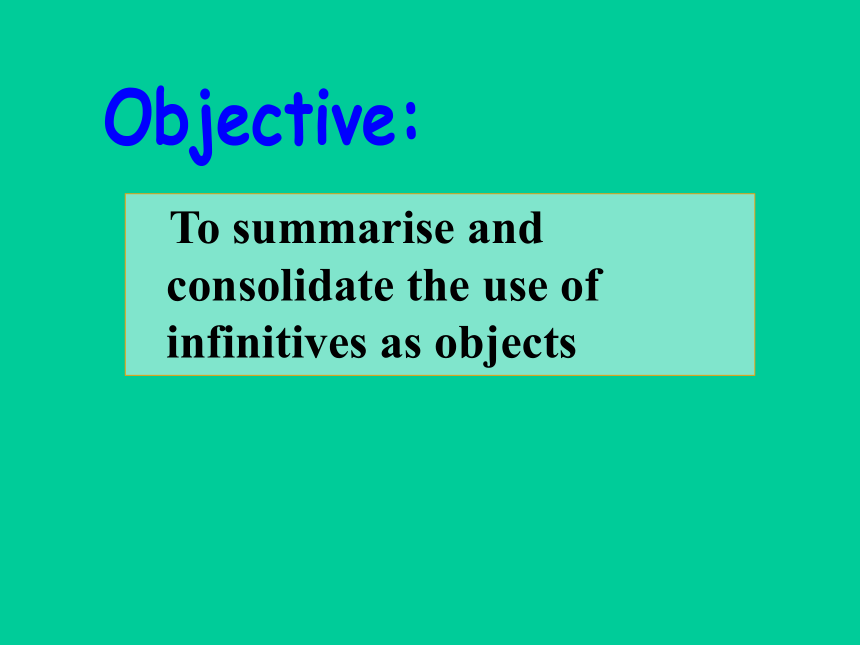
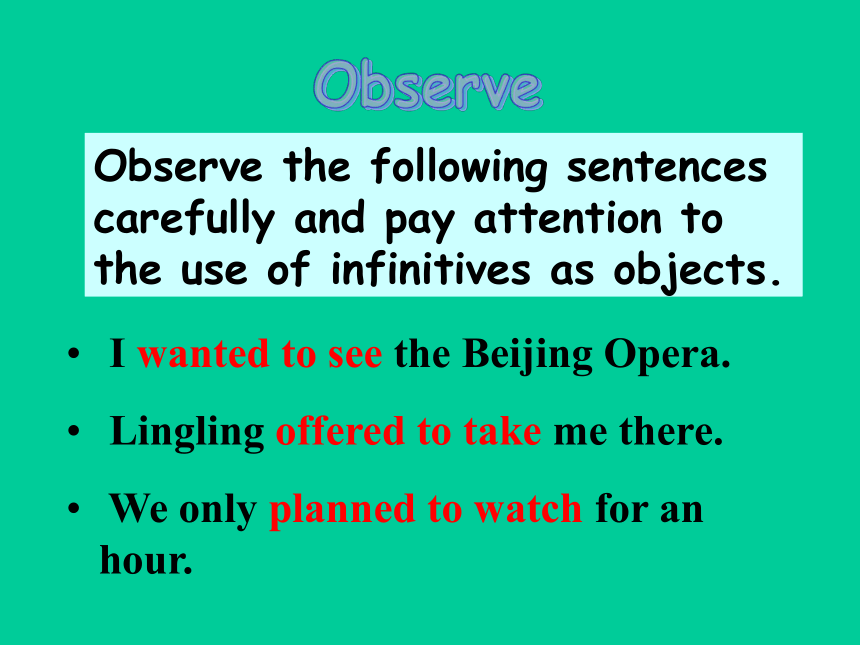
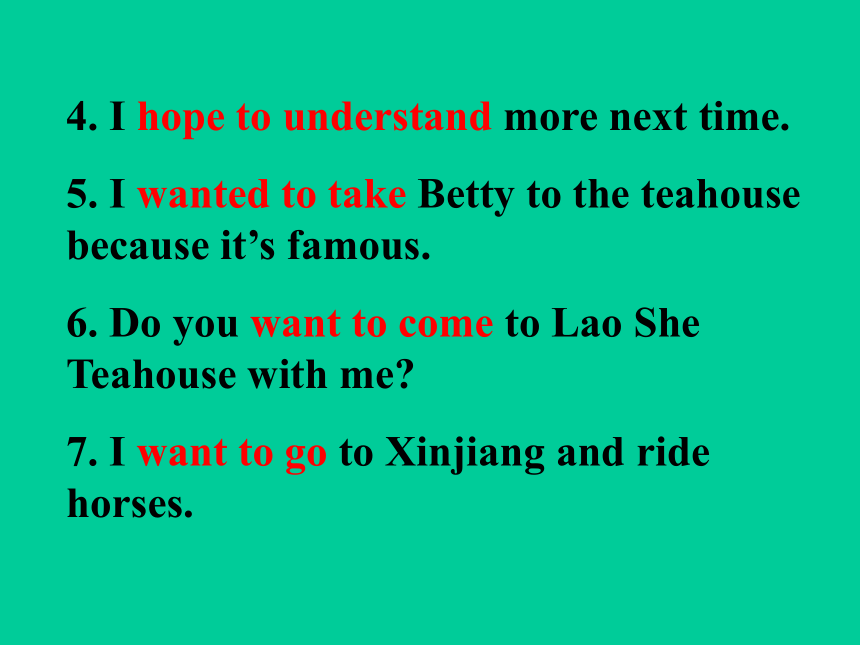

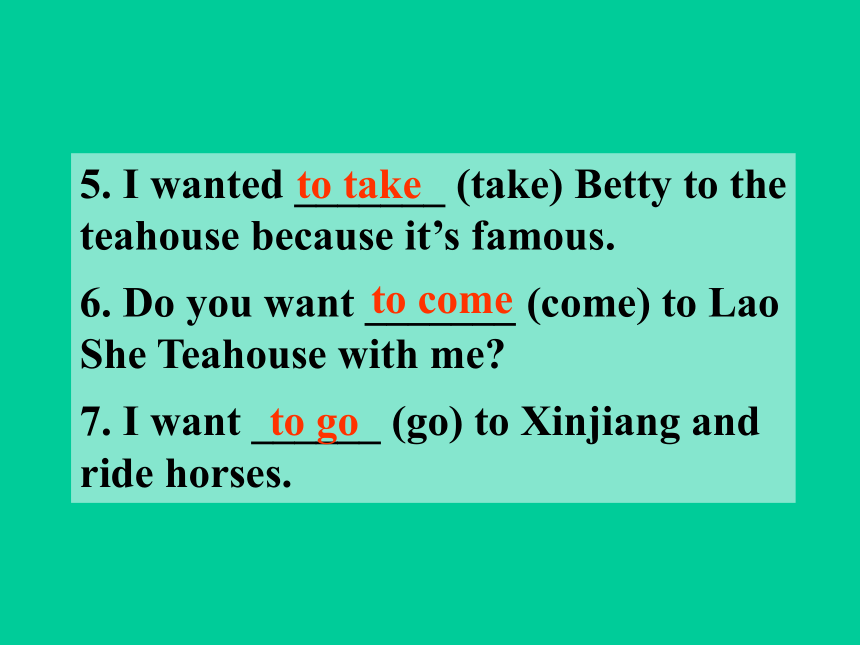


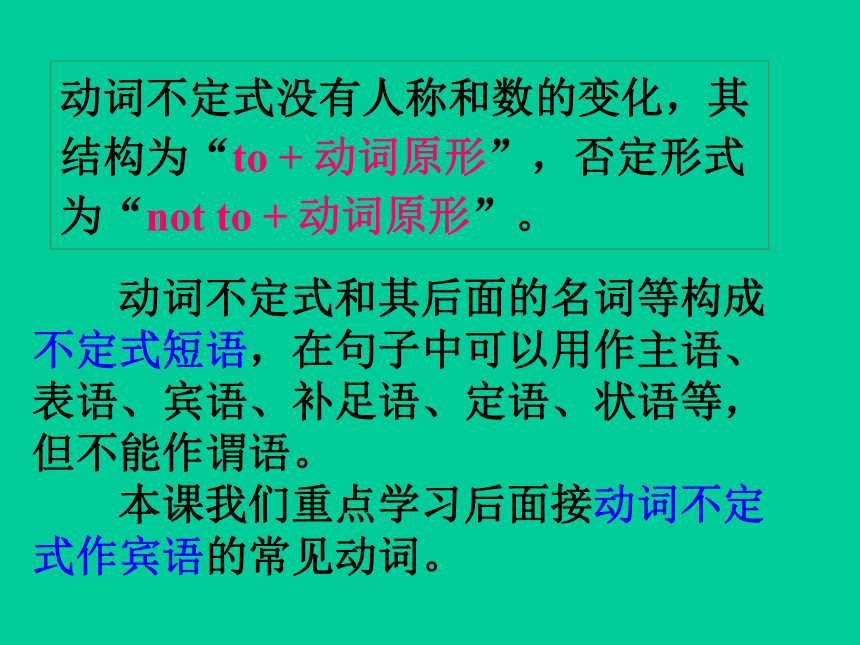
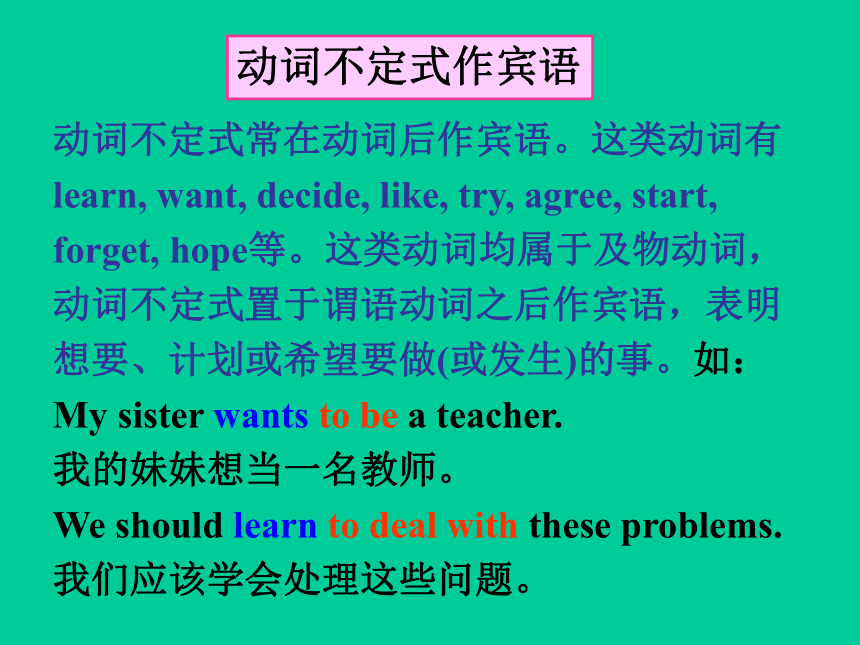
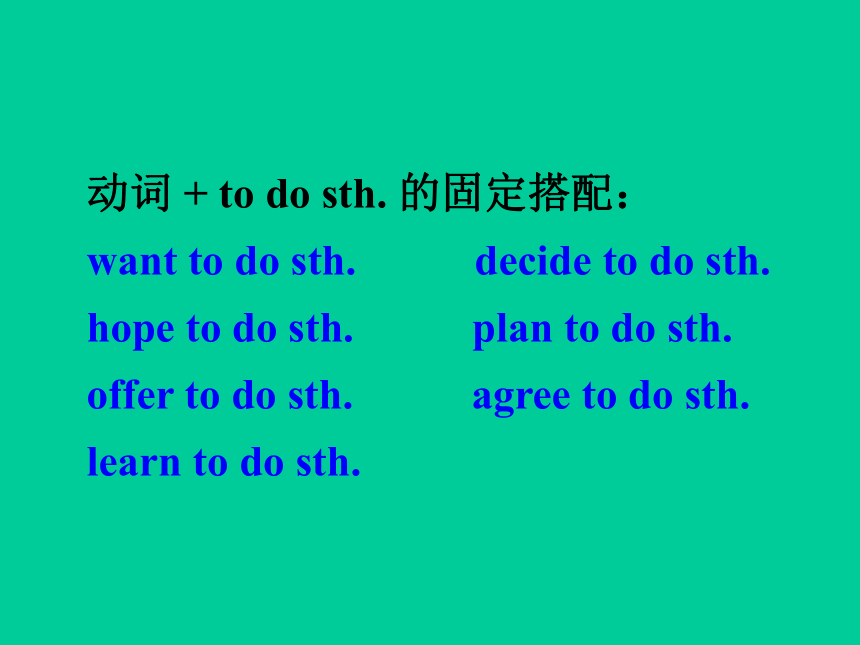

文档简介
(共30张PPT)
Unit
3
Language
in
use
Module
5
Lao
She
Teahouse
To
summarise
and
consolidate
the
use
of
infinitives
as
objects
Observe
the
following
sentences
carefully
and
pay
attention
to
the
use
of
infinitives
as
objects.
I
wanted
to
see
the
Beijing
Opera.
Lingling
offered
to
take
me
there.
We
only
planned
to
watch
for
an
hour.
4.
I
hope
to
understand
more
next
time.
5.
I
wanted
to
take
Betty
to
the
teahouse
because
it’s
famous.
6.
Do
you
want
to
come
to
Lao
She
Teahouse
with
me?
7.
I
want
to
go
to
Xinjiang
and
ride
horses.
1.
I
wanted
______
(see)
the
Beijing
Opera.
2.
Lingling
offered
______
(take)
me
there.
3.
We
only
planned
_________
(watch)
for
an
hour.
4.
I
hope
_____________
(understand)
more
next
time.
to
see
to
take
to
watch
to
understand
go
Ready?
5.
I
wanted
_______
(take)
Betty
to
the
teahouse
because
it’s
famous.
6.
Do
you
want
_______
(come)
to
Lao
She
Teahouse
with
me?
7.
I
want
______
(go)
to
Xinjiang
and
ride
horses.
to
take
to
come
to
go
当两个动词连用时,主要行为动词后面的动词采用了“to
+
动词原形”的结构,即动词不定式。
什么是动词不定式(‘to-infinitives’)?
We
decided
to
stay
for
a
cup
of
tea.
我们决定留下来喝杯茶。
动词不定式
动词不定式没有人称和数的变化,其结构为“to
+
动词原形”,否定形式为“not
to
+
动词原形”。
动词不定式和其后面的名词等构成不定式短语,在句子中可以用作主语、表语、宾语、补足语、定语、状语等,但不能作谓语。
本课我们重点学习后面接动词不定式作宾语的常见动词。
动词不定式常在动词后作宾语。这类动词有
learn,
want,
decide,
like,
try,
agree,
start,
forget,
hope等。这类动词均属于及物动词,动词不定式置于谓语动词之后作宾语,表明想要、计划或希望要做(或发生)的事。如:
My
sister
wants
to
be
a
teacher.
我的妹妹想当一名教师。
We
should
learn
to
deal
with
these
problems.
我们应该学会处理这些问题。
动词不定式作宾语
动词
+
to
do
sth.
的固定搭配:
want
to
do
sth.
decide
to
do
sth.
hope
to
do
sth.
plan
to
do
sth.
offer
to
do
sth.
agree
to
do
sth.
learn
to
do
sth.
以下部分为课本练习,供老师在对答案时选择使用。
1.
We
decided
_______
at
home
because
it
was
raining.
2.
Lao
She
started
________
Chinese
in
London
in
1924.
3.
I
tried
________
poems.
4.
They
plan
______
a
film
tomorrow.
5.
I
want
________
my
holiday
in
Beijing.
Complete
the
sentences
with
the
correct
form
of
the
words
in
the
box.
see
spend
stay
teach
write
Do
you
want
to
go
to
the
teahouse?
to
stay
1
P38
to
teach
to
write
to
see
to
spend
Read
the
conversation
and
complete
the
note
with
the
correct
form
of
the
words
in
the
box.
advise
decide
offer
want
2
P38
Betty
(1)
_______to
see
the
Beijing
Opera
again.
Lingling
(2)_______
to
take
her.
Daming
(3)
_______
them
to
go
to
Mei
Lanfang
Theatre.
Lingling
(4)
______
to
go
next
Saturday.
wanted
offered
advised
decided
Complete
the
passage
with
the
correct
form
of
the
words
in
brackets.
Lu
Xun
is
one
of
the
greatest
writers
of
modern
China.
He
was
born
in
Shaoxing,
Zhejiang
Province,
in
1881.
At
first,
Lu
Xun
hoped
(1)
_______
(help)
the
Chinese
people
become
healthy
and
strong,
so
he
decided
(2)_____
(be)
a
doctor.
to
help
to
be
3
P39
After
a
few
years,
he
started
(3)
_______
(write)
short
stories
because
he
wanted
(4)_______
(teach)
people
about
society.
One
of
his
most
famous
stories
is
The
True
Story
of
Ah
Q.
It
describes
the
hard
life
of
Ah
Q
and
makes
people
(5)
_____
(think)
about
society.
In
the
1920s,
people
began
to
translate
his
works
into
English.
to
write
to
teach
think
P39
4
Complete
the
passage
with
the
correct
form
of
the
words
and
expression
in
the
box.
We
went
to
the
(1)
_______
last
night
to
see
a
play.
I
had
a
(2)
________
evening.
The
play
was
very
good
and
all
the
actors
were
excellent.
The
story
(3)
________
in
a
small
village
in
China.
It
was
all
about
an
old
box
of
gold!
The
box
was
a
(4)
_______
box
and
was
difficult
to
open.
The
play
was
very
interesting,
and
everyone
(5)
_______
at
the
end
of
the
play!
cheer
magic
take
place
theatre
wonderful
theatre
wonderful
took
place
magic
cheered
Listen
and
choose
the
correct
answer.
Who
is
visiting
London?
a)
Vicky
b)
Steve
c)
Remoe
2.
What
are
they
talking
about?
a)
Romeo
and
Juliet
b)
London
c)
Vicky’s
parents
5
P39
Listen
again
and
check
(√)
the
true
sentences.
1.Steve
went
to
Shakespeare’s
Globe
Theatre
last
night.
2.
Vicky
offered
to
take
Steve
to
the
theatre.
3.
Steve
did
not
try
to
understand
the
words.
4.
Vicky
hopes
to
see
her
favourite
play.
5.
Vicky
thinks
her
parents
will
take
her
to
the
theatre.
√
√
√
6
P39
注:
word
文档
点击此处链接
Tapescript:
Vicky:
Hello,
Steve.
Are
you
enjoying
your
visit
to
London?
Steve:
Thank
you
for
asking,
Vicky.
I’m
having
a
great
time.
We
went
to
Shakespeare’s
Globe
Theatre
last
night.
Vicky:
Oh
yes,
it’s
great.
A
lot
of
tourists
want
to
go
there.
Steve:
Yes,
my
uncle
offered
to
take
us,
and
we
decided
to
see
Romeo
and
Juliet.
Vicky:
Did
you
understand
the
play?
Steve:
Well,
I
tried
to
understand
the
words.
It
was
very
difficult.
But
I
know
the
story.
Vicky:
I
hope
to
see
Romeo
and
Juliet
too.
It’s
my
favourite
play.
Steve:
Will
your
parents
agree
to
take
you?
Vicky:
Yes,
I’m
sure
they
will.
P40
7
Work
in
pairs.
Talk
about
your
weekend
plans.
Use
the
words
and
expressions
in
the
box
to
help
you.
hope
how
about
let’s
want
why
don’t
we
why
not
would
like
—
I
want
to
see
the
Beijing
Opera?
—
Why
don’t
we…?
P40
8
Read
the
passage
and
choose
the
correct
answer.
1
You
would
find
the
passage
in
________.
a)
a
book
b)
a
school
newspaper
c)
a
magazine
2
The
writer
_________.
a)
liked
the
play
b)
did
not
like
the
play
c)
did
not
say
he
liked
the
play
or
not
3
The
actors
and
actresses
in
the
play
wore
________.
a)
the
same
clothes
as
today
b)
their
best
clothes
c)
clothes
of
the
first
half
of
the
twentieth
century
4
Li
Nan
is
_________.
a)
a
famous
actor
b)
a
student
c)
an
actress
Acting
out
a
scene
from
a
play
Step
1:
Work
in
groups.
Find
a
play.
Think
about
these
questions.
1.
Where
does
it
take
place?
2.
Who
is
in
it?
3.
What
is
the
story?
4.
What
are
the
special
moments
in
it?
Step
2:
Choose
a
scene
and
practise
it.
Step
3:
Act
out
the
scene
in
front
of
the
class.
动词不定式作宾语,表“想要,计划或希望要做的事”。
Ⅰ.
用所给动词的适当形式填空。
1.
Don’t
worry.
I’ll
try
________
(help)
you.
2.
Remember
_______
(give)
some
food
to
the
pet
dog
every
day.
3.
Please
don’t
forget
_________
(clean)
the
room
while
I
am
away
in
Beijing.
4.
—What’s
your
plan
for
the
summer
holiday?
—I
decided
________
(stay)
at
home
and
have
a
good
rest
first.
to
help
to
give
注:
word
文档
点击此处链接
Quiz
to
clean
to
stay
Homework
1.
Finish
the
exercises
in
Learning
English.
2.
Preview
the
new
words
and
expressions
in
Module
6.
Unit
3
Language
in
use
Module
5
Lao
She
Teahouse
To
summarise
and
consolidate
the
use
of
infinitives
as
objects
Observe
the
following
sentences
carefully
and
pay
attention
to
the
use
of
infinitives
as
objects.
I
wanted
to
see
the
Beijing
Opera.
Lingling
offered
to
take
me
there.
We
only
planned
to
watch
for
an
hour.
4.
I
hope
to
understand
more
next
time.
5.
I
wanted
to
take
Betty
to
the
teahouse
because
it’s
famous.
6.
Do
you
want
to
come
to
Lao
She
Teahouse
with
me?
7.
I
want
to
go
to
Xinjiang
and
ride
horses.
1.
I
wanted
______
(see)
the
Beijing
Opera.
2.
Lingling
offered
______
(take)
me
there.
3.
We
only
planned
_________
(watch)
for
an
hour.
4.
I
hope
_____________
(understand)
more
next
time.
to
see
to
take
to
watch
to
understand
go
Ready?
5.
I
wanted
_______
(take)
Betty
to
the
teahouse
because
it’s
famous.
6.
Do
you
want
_______
(come)
to
Lao
She
Teahouse
with
me?
7.
I
want
______
(go)
to
Xinjiang
and
ride
horses.
to
take
to
come
to
go
当两个动词连用时,主要行为动词后面的动词采用了“to
+
动词原形”的结构,即动词不定式。
什么是动词不定式(‘to-infinitives’)?
We
decided
to
stay
for
a
cup
of
tea.
我们决定留下来喝杯茶。
动词不定式
动词不定式没有人称和数的变化,其结构为“to
+
动词原形”,否定形式为“not
to
+
动词原形”。
动词不定式和其后面的名词等构成不定式短语,在句子中可以用作主语、表语、宾语、补足语、定语、状语等,但不能作谓语。
本课我们重点学习后面接动词不定式作宾语的常见动词。
动词不定式常在动词后作宾语。这类动词有
learn,
want,
decide,
like,
try,
agree,
start,
forget,
hope等。这类动词均属于及物动词,动词不定式置于谓语动词之后作宾语,表明想要、计划或希望要做(或发生)的事。如:
My
sister
wants
to
be
a
teacher.
我的妹妹想当一名教师。
We
should
learn
to
deal
with
these
problems.
我们应该学会处理这些问题。
动词不定式作宾语
动词
+
to
do
sth.
的固定搭配:
want
to
do
sth.
decide
to
do
sth.
hope
to
do
sth.
plan
to
do
sth.
offer
to
do
sth.
agree
to
do
sth.
learn
to
do
sth.
以下部分为课本练习,供老师在对答案时选择使用。
1.
We
decided
_______
at
home
because
it
was
raining.
2.
Lao
She
started
________
Chinese
in
London
in
1924.
3.
I
tried
________
poems.
4.
They
plan
______
a
film
tomorrow.
5.
I
want
________
my
holiday
in
Beijing.
Complete
the
sentences
with
the
correct
form
of
the
words
in
the
box.
see
spend
stay
teach
write
Do
you
want
to
go
to
the
teahouse?
to
stay
1
P38
to
teach
to
write
to
see
to
spend
Read
the
conversation
and
complete
the
note
with
the
correct
form
of
the
words
in
the
box.
advise
decide
offer
want
2
P38
Betty
(1)
_______to
see
the
Beijing
Opera
again.
Lingling
(2)_______
to
take
her.
Daming
(3)
_______
them
to
go
to
Mei
Lanfang
Theatre.
Lingling
(4)
______
to
go
next
Saturday.
wanted
offered
advised
decided
Complete
the
passage
with
the
correct
form
of
the
words
in
brackets.
Lu
Xun
is
one
of
the
greatest
writers
of
modern
China.
He
was
born
in
Shaoxing,
Zhejiang
Province,
in
1881.
At
first,
Lu
Xun
hoped
(1)
_______
(help)
the
Chinese
people
become
healthy
and
strong,
so
he
decided
(2)_____
(be)
a
doctor.
to
help
to
be
3
P39
After
a
few
years,
he
started
(3)
_______
(write)
short
stories
because
he
wanted
(4)_______
(teach)
people
about
society.
One
of
his
most
famous
stories
is
The
True
Story
of
Ah
Q.
It
describes
the
hard
life
of
Ah
Q
and
makes
people
(5)
_____
(think)
about
society.
In
the
1920s,
people
began
to
translate
his
works
into
English.
to
write
to
teach
think
P39
4
Complete
the
passage
with
the
correct
form
of
the
words
and
expression
in
the
box.
We
went
to
the
(1)
_______
last
night
to
see
a
play.
I
had
a
(2)
________
evening.
The
play
was
very
good
and
all
the
actors
were
excellent.
The
story
(3)
________
in
a
small
village
in
China.
It
was
all
about
an
old
box
of
gold!
The
box
was
a
(4)
_______
box
and
was
difficult
to
open.
The
play
was
very
interesting,
and
everyone
(5)
_______
at
the
end
of
the
play!
cheer
magic
take
place
theatre
wonderful
theatre
wonderful
took
place
magic
cheered
Listen
and
choose
the
correct
answer.
Who
is
visiting
London?
a)
Vicky
b)
Steve
c)
Remoe
2.
What
are
they
talking
about?
a)
Romeo
and
Juliet
b)
London
c)
Vicky’s
parents
5
P39
Listen
again
and
check
(√)
the
true
sentences.
1.Steve
went
to
Shakespeare’s
Globe
Theatre
last
night.
2.
Vicky
offered
to
take
Steve
to
the
theatre.
3.
Steve
did
not
try
to
understand
the
words.
4.
Vicky
hopes
to
see
her
favourite
play.
5.
Vicky
thinks
her
parents
will
take
her
to
the
theatre.
√
√
√
6
P39
注:
word
文档
点击此处链接
Tapescript:
Vicky:
Hello,
Steve.
Are
you
enjoying
your
visit
to
London?
Steve:
Thank
you
for
asking,
Vicky.
I’m
having
a
great
time.
We
went
to
Shakespeare’s
Globe
Theatre
last
night.
Vicky:
Oh
yes,
it’s
great.
A
lot
of
tourists
want
to
go
there.
Steve:
Yes,
my
uncle
offered
to
take
us,
and
we
decided
to
see
Romeo
and
Juliet.
Vicky:
Did
you
understand
the
play?
Steve:
Well,
I
tried
to
understand
the
words.
It
was
very
difficult.
But
I
know
the
story.
Vicky:
I
hope
to
see
Romeo
and
Juliet
too.
It’s
my
favourite
play.
Steve:
Will
your
parents
agree
to
take
you?
Vicky:
Yes,
I’m
sure
they
will.
P40
7
Work
in
pairs.
Talk
about
your
weekend
plans.
Use
the
words
and
expressions
in
the
box
to
help
you.
hope
how
about
let’s
want
why
don’t
we
why
not
would
like
—
I
want
to
see
the
Beijing
Opera?
—
Why
don’t
we…?
P40
8
Read
the
passage
and
choose
the
correct
answer.
1
You
would
find
the
passage
in
________.
a)
a
book
b)
a
school
newspaper
c)
a
magazine
2
The
writer
_________.
a)
liked
the
play
b)
did
not
like
the
play
c)
did
not
say
he
liked
the
play
or
not
3
The
actors
and
actresses
in
the
play
wore
________.
a)
the
same
clothes
as
today
b)
their
best
clothes
c)
clothes
of
the
first
half
of
the
twentieth
century
4
Li
Nan
is
_________.
a)
a
famous
actor
b)
a
student
c)
an
actress
Acting
out
a
scene
from
a
play
Step
1:
Work
in
groups.
Find
a
play.
Think
about
these
questions.
1.
Where
does
it
take
place?
2.
Who
is
in
it?
3.
What
is
the
story?
4.
What
are
the
special
moments
in
it?
Step
2:
Choose
a
scene
and
practise
it.
Step
3:
Act
out
the
scene
in
front
of
the
class.
动词不定式作宾语,表“想要,计划或希望要做的事”。
Ⅰ.
用所给动词的适当形式填空。
1.
Don’t
worry.
I’ll
try
________
(help)
you.
2.
Remember
_______
(give)
some
food
to
the
pet
dog
every
day.
3.
Please
don’t
forget
_________
(clean)
the
room
while
I
am
away
in
Beijing.
4.
—What’s
your
plan
for
the
summer
holiday?
—I
decided
________
(stay)
at
home
and
have
a
good
rest
first.
to
help
to
give
注:
word
文档
点击此处链接
Quiz
to
clean
to
stay
Homework
1.
Finish
the
exercises
in
Learning
English.
2.
Preview
the
new
words
and
expressions
in
Module
6.
同课章节目录
- Module 1 How to learn English
- Unit 1 Let's try to speak English as much as possi
- Unit 2 You should smile at her.
- Unit 3 Language in use .
- Module 2 My home town and my country
- Unit 1 It's taller than many other buildings.
- Unit 2 Cambridge is a beautiful city in the east o
- Unit 3 Language in use .
- Module 3 Sports.
- Unit 1 Nothing is more exciting than playing tenni
- Unit 2 This year we training more carefully.
- Unit 3 Language in use .
- Module 4 Planes, ships and trains .
- Unit 1 He lives the farthest from school.
- Unit 2 What is the best way to travel.
- Unit 3 Language in use .
- Module 5 Lao She Teahouse.
- Unit 1 I wanted to see the Beijing Opera.
- Unit 2 It descibes the changes in Chinese society.
- Unit 3 Language in use .
- Module 6 Animals in danger.
- Unit 1 It allows people to get closer to them .
- Unit 2 The WWF is working hard to save them all.
- Unit 3 Language in use .
- Revision module A
- Module 7 A famous story
- Unit 1 Alice was sitting with her sister by the ri
- Unit 2 She was thinking about her cat.
- Unit 3 Language in use .
- Module 8 Accidents
- Unit 1 While the car were changing to red, a car s
- Unit 2 I was trying to pick it up when it bite me
- Unit 3 Language in use .
- Module 9 Population
- Unit 1 The population of China is about 1.37 billi
- Unit 2 Arnwick was a city with 200,000 people.
- Unit 3 Language in use .
- Module 10 The weathe
- Unit 1 It might snow.
- Unit 2 The weather is fine all year round.
- Unit 3 Language in use .
- Module 11 Way of life
- Unit 1 In China ,we open a gift later.
- Unit 2 In England, you usually drink tea with milk
- Unit 3 Language in use .
- Module 12 Help
- Unit 1 What should we do before help arrives?
- Unit 2 Stay away from windows and heavy furniture.
- Unit 3 Language in use .
- Revision module B
